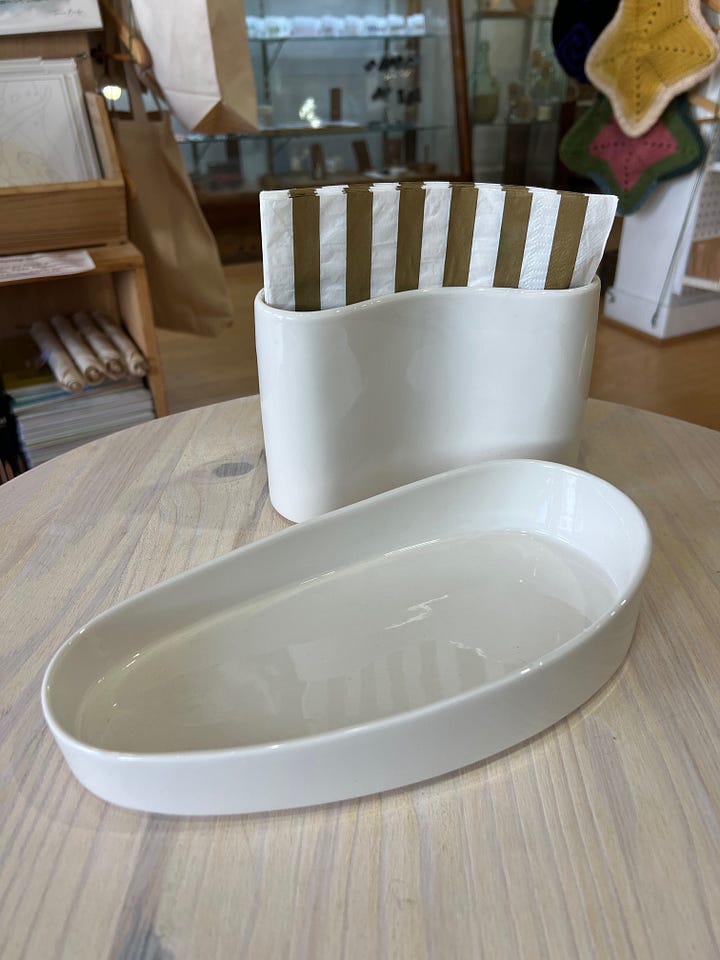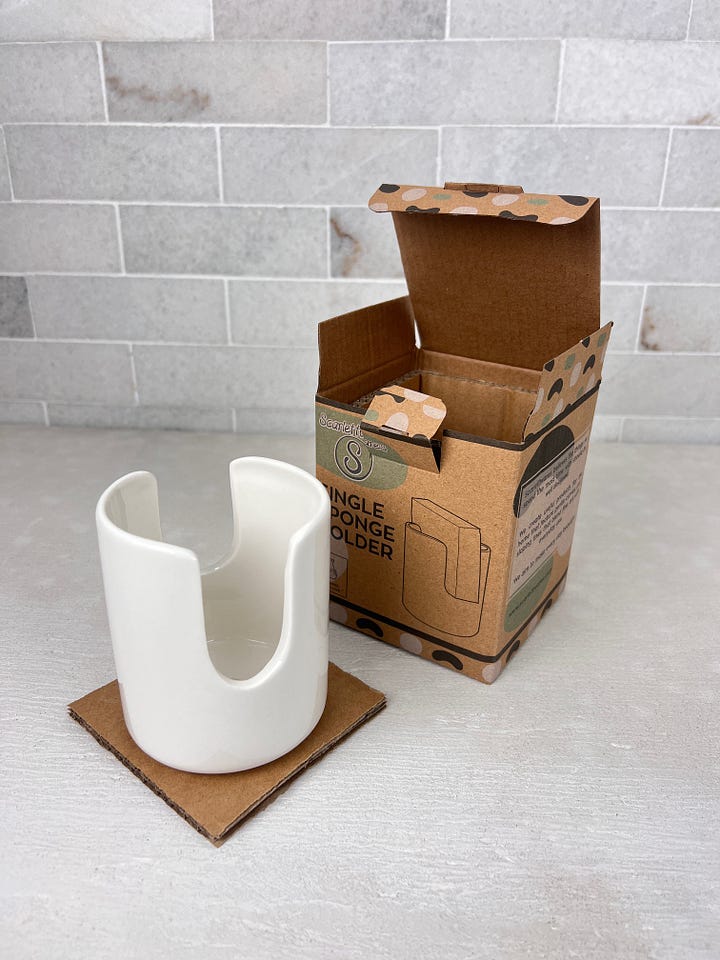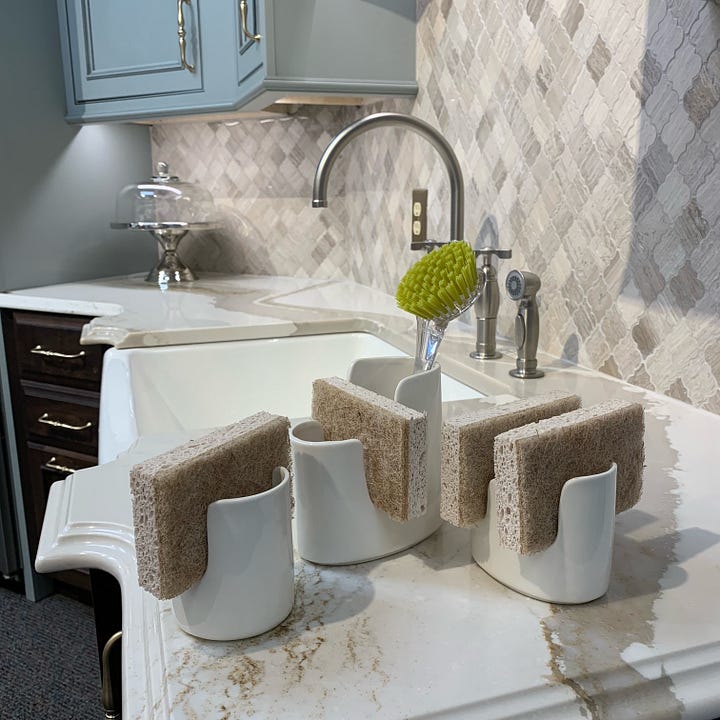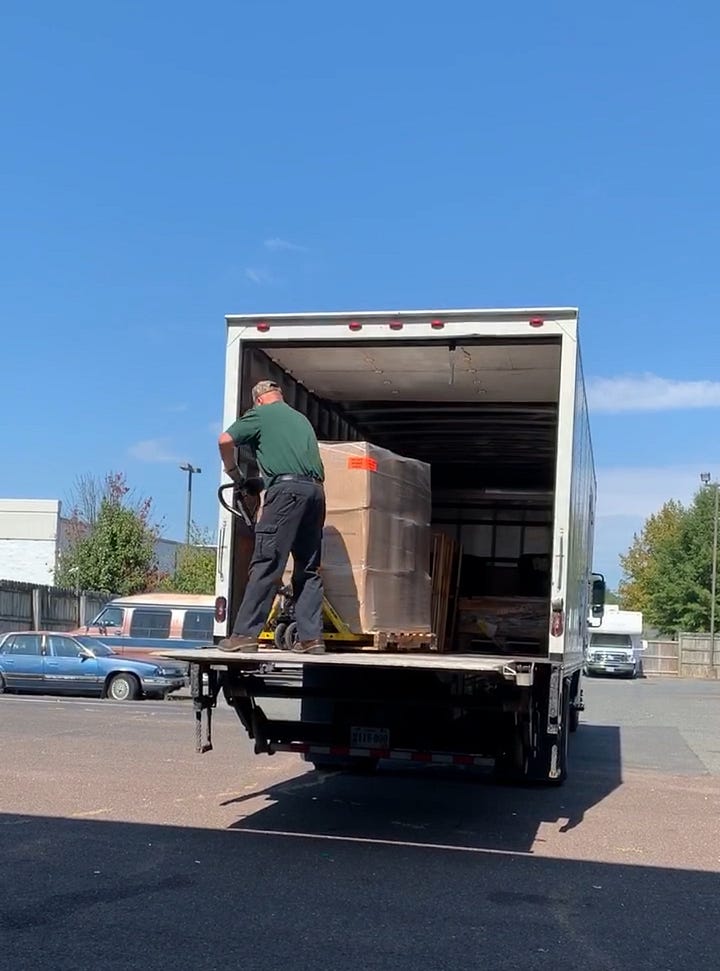EXECUTIVE ORDERS PROJET - ECONOMY: Local Business Owner Fears Losing Half Her Business Due to Import Tariffs
Ceramic artist Scarlett Pons spoke to the Advance about the effects of tariffs on imports from China, where her line of home wares is manufactured.
By Adele Uphaus
MANAGING EDITOR AND CORRESPONDENT
Email Adele


Scarlett Pons was keeping track of the tariffs imposed by the Trump Administration on goods from China—until they went past 30% earlier this month.
Once that happened, she thought, “What’s the point?”
“I stopped listening to the news because the tariffs are up so high now that it’s ridiculous,” Pons said. “It’s not even worth listening to.”
She’s now working off the baseline assumption that half of her business is gone.
Pons, a ceramic artist, and her husband Gabriel, a muralist, are the owners of Ponshop, a studio and gallery in downtown Fredericksburg. The shop, which sells the couple’s own art plus items handmade by other local and regional artists, is half of their business.
The other half—the half that they’re now assuming is gone—is Scarlett Pons’s line of ceramic home items, Scarlettwares, which are manufactured in China and sold online through her website and through Amazon and Wayfair.
“These are ceramic items that I used to handmake and they were very popular, so I moved them into manufacturing in 2018,” Pons said. “With these tariffs in place, I have no idea how this half of our business will continue to move forward.”
The White House confirmed earlier this month that the total tariff applied to all imports from China is 145%. For Pons, that means an item that used to cost her $5 now costs her $12.
“I don’t even do the math,” she said. “It’s just pointless. We were OK with a 10% or even a 20% tariff—we could have absorbed that and made it through the year without raising our prices. A 10% tariff on a $5 project means the cost goes up minimally, but if it more than doubles …”
Pons said that before launching her product line, she spent a year looking for an American manufacturer.
“I learned that manufacturing left this country about 60 years ago, so it’s not been an option for decades,” she said. “There literally is no other choice.
Pons ended up partnering with a U.S.-based, family-owned company that took note of what was happening with manufacturing in the 1960s and was one of the first to move all their work overseas.


The company has relationships with manufacturers across Asia and Europe.
“They maintain very personal one-on-one relationships—every year they go and visit their manufacturers,” Pons said. “And I’m just amazed at the quality of the product. They’re still handmade items.”
At one point, she asked her manufacturing partner whether he would be able to open a factory in the U.S.
“He said, ‘It’s impossible,’” Pons said. “To get a factory going to make that type of product—cast ceramics—would be $12 million. That was his estimate.”
‘This makes COVID feel like a cake walk’
Pons said that since the tariff news, she feels “like I’ve had the rug pulled out from under my feet so quickly and unexpectedly.”
The COVID-19 pandemic also created a sense of uncertainty, but that felt “like a cake walk” compared to this uncertainty, she said.
“There were rules during COVID and there are no rules right now,” Pons said.
Also, during the pandemic, the community rallied around the need to support small businesses, Pons said.
Now, she said, there’s not as much talk about it.
“I don’t think we realize how many small businesses are like [mine],” she said. For instance, if someone has a small wholesale candle business, the jars those candles are sold in likely come from China.
This week, the U.S. Chamber of Commerce published a round-up of comments from small business owners across the country on the effects of the tariffs. All reflect Pons’s experience.
“Many of the components impacted by these tariffs are not available from U.S. manufacturers, leaving us facing skyrocketing tariff costs, disrupted supply chains, and a shrinking ability to compete in our own market,” said the president of a Kentucky-based HVAC distribution company. “Worse still, these policy shifts have occurred with little notice and no structured plan for transitioning to domestic production.”
The manager of Esembly, a cloth-diapering service based in Brooklyn, New York, said the tariffs, “create harmful consequences: forcing price increases on essential products, penalizing our use of sustainable materials, and disproportionately impacting small businesses like ours.”
The owner of Michigan-based Sonic Alert, which makes products for the deaf community, said the current tariff is “more than the profit we will make from selling the product.”
“Our company that has been in business since 1979 could be forced to close since we had no opportunity to plan for these changes to our operating environment,” he said in the article. “The deaf community will lose the largest supplier of products developed to help them be alerted to their doorbells, telephones, and most importantly, smoke and fire alarm.”
In an article published in Forbes in March, Ben Johnson, the chief operating officer of small business lender Kapitus, said tariffs “could over time make manufacturing in the U.S. more economical than importing goods from abroad, which could be good for some industries.
“But in the short- to medium-term, these tariffs are likely to drive inflation significantly higher and cause significant disruption to the global supply chain, threatening many U.S. jobs at manufacturers, wholesalers, and retailers who rely on the global supply chain to source the components, raw materials, and finished products they sell,” he said.
Pons said she agrees that tariffs could have the desired effect for some industries, but that the blanket application of them to all imports is like “a big sledgehammer.”
And as a small business owner, she isn’t able to wait and see what happens in the global import market.
“There is no sitting around and waiting. That’s not an option,” she said. “So we’re looking to see what we can do through the store to make up [the missing half of the business.]”
Pons said it’s “very unlike” her to talk about “the thing that’s not positive.”
“I’ve never done that before,” she said. “But I decided I’m going to be honest about how the rug is being pulled out from under our feet.”
Local Obituaries
To view local obituaries or to send a note to family and loved ones, please visit the link that follows.
Support Award-winning, Locally Focused Journalism
The FXBG Advance cuts through the talking points to deliver both incisive and informative news about the issues, people, and organizations that daily affect your life. And we do it in a multi-partisan format that has no equal in this region. Over the past year, our reporting was:
First to break the story of Stafford Board of Supervisors dismissing a citizen library board member for “misconduct,” without informing the citizen or explaining what the person allegedly did wrong.
First to explain falling water levels in the Rappahannock Canal.
First to detail controversial traffic numbers submitted by Stafford staff on the Buc-ee’s project
Our media group also offers the most-extensive election coverage in the region and regular columnists like:
And our newsroom is led by the most-experienced and most-awarded journalists in the region — Adele Uphaus (Managing Editor and multiple VPA award-winner) and Martin Davis (Editor-in-Chief, 2022 Opinion Writer of the Year in Virginia and more than 25 years reporting from around the country and the world).
For just $8 a month, you can help support top-flight journalism that puts people over policies.
Your contributions 100% support our journalists.
Help us as we continue to grow!
This article is published under Creative Commons license CC BY-NC-ND. It can be distributed for noncommercial purposes and must include the following: “Published with permission by FXBG Advance.”













